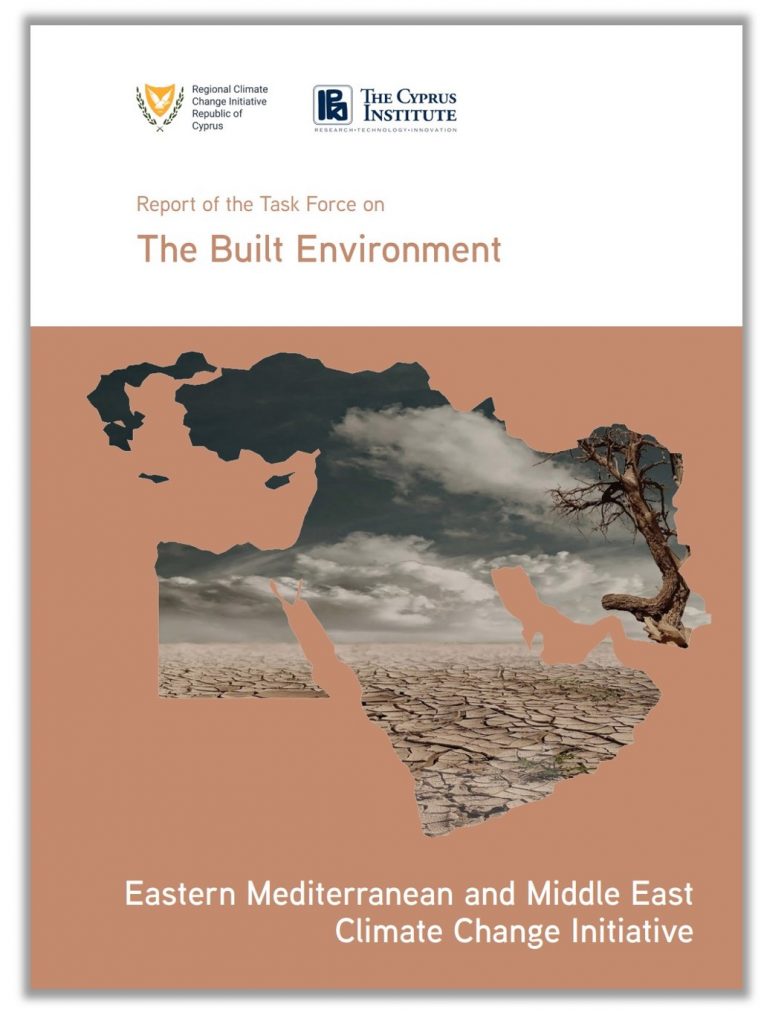
Built Environment
The report of the Built Environment TF provides a review of how climate change will exacerbate the problems of the built environment sector in the EMME region. It highlights the most critical problems and provides a future outlook about the needs of the regional built environment…
The report summarizes the policy landscape of mitigation and adaptation strategies already implemented in the EMME countries and provides examples of possible actions, as well as technologically matured and economically affordable solutions for effectively addressing the climate challenges that the built environments will face in the region. Furthermore, the report provides a clear roadmap for a transition towards sustainable cities.
This report is intended to serve and support national governments, local and municipal authorities, researchers and scientists, planning and design communities, private sector enterprises, international organisations (including international corporations and development banks) and civil society including indigenous peoples, in developing blueprints and action plans for new evidence-based research and knowledge that supports effective climate action in cities. This document signposts key issues that will require research to help guide effective policy development for climate action in cities.
(Click here to download the report in .pdf format)
Abstract from the Report of the Task Force on the Built Environment
Task Force
In line with the global community, countries in the EMME recognise the urgent need to address regional and national climate change impacts, exhibiting a willingness to comply with international commitments stipulated by the Paris Agreement (Horowitz 2016). The next step is to develop a regional action plan addressing the specific needs and challenges that countries are facing and outlining a pathway of adaptation and mitigation.
Building on a previous study (Prieur-Richard et al. 2019), this report outlines an evidence-based roadmap toward effective climate action implementation at the city level. As it considers how climate change will exacerbate the problems already faced by the region’s built environment, it recommends actions and solutions that are economically viable and technologically mature. By providing urban policymakers with access to a comprehensive summary of regional knowledge and good practices, it seeks to support the transition toward sustainable cities.
The report thus aims to provide a solid framework for mitigation and adaptation planning in the EMME context. It draws on previous studies and intends to offer support to multiple stakeholders, ranging from national and local governmental bodies, urban planning professionals to private parties with vested interests, international and non-governmental organisations and civil society.
Chapter 2 summarises key geopolitical and socio-economic characteristics of the region, which together with climatic features will inform a structured response to the adverse effects of climate change. Chapter 3 aims at describing the main characteristics of the region’s built environment (Section 3.1), highlighting its most critical problems (Section 3.2) and considering the future (Section 3.3). In Chapter 4, mitigation and adaptation strategies
are briefly outlined. Next, the policy landscape is reconstructed in Chapter 5. Finally, in Chapter 6, lessons learnt and research initiatives are presented, and main conclusions are drawn in Chapter 7.

By clicking on the image you can read, print, or download the Report
Task Force Management Board
Prof. Salvatore Carlucci, The Cyprus Institute
Prof. Manfred Lange, Future Earth MENA Regional Center
Prof. George Artopoulos, The Cyprus Institute
Task Force Members
Prof. Hanan M. Albuflasa, University of Bahrain
Prof. Margarita-Niki Assimakopoulos, University of Athens
Prof. Shady Attia, University of Liège
Prof. Elie Azar, Khalifa University of Science and Technology
Prof. Erdem Cüce, Recep Tayyip Erdogan University
Dr. Ali Hajiah, Kuwait Institute of Scientific Research
Prof. Isaac A. Meir, Ben-Gurion University
Prof. Marina Neophytou, The University of Cyprus
Ms. Melina Nicolaides, Activate Non-profit Arts Organisation
Prof. Despina Serghides, The Cyprus Institute
Prof. Aaron Sprecher, Technion Israel Institute of Technology
Dr. Muhieddin Tawalbeh, National Energy Research Centre, Royal Scientific Society
Editorial Review and Assistance
Ms. Ioanna Kyprianou, The Cyprus Institute
Dr. Stavroula Thravalou, The Cyprus Institute

